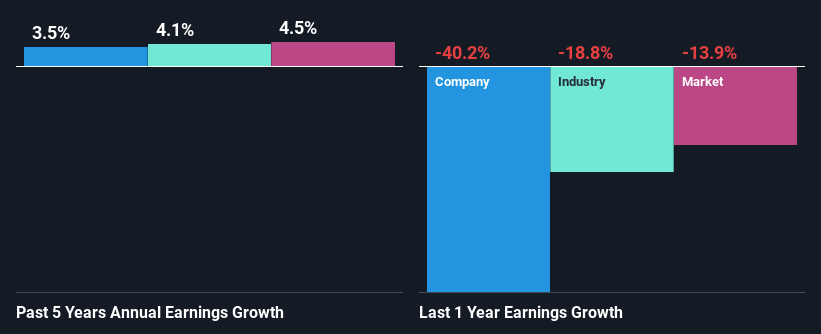Is Marsden Maritime Holdings Limited's (NZSE:MMH) Recent Price Movement Underpinned By Its Weak Fundamentals?
With its stock down 7.8% over the past three months, it is easy to disregard Marsden Maritime Holdings (NZSE:MMH). It seems that the market might have completely ignored the positive aspects of the company's fundamentals and decided to weigh-in more on the negative aspects. Stock prices are usually driven by a company’s financial performance over the long term, and therefore we decided to pay more attention to the company's financial performance. Particularly, we will be paying attention to Marsden Maritime Holdings' ROE today.
Return on equity or ROE is an important factor to be considered by a shareholder because it tells them how effectively their capital is being reinvested. In short, ROE shows the profit each dollar generates with respect to its shareholder investments.
Check out our latest analysis for Marsden Maritime Holdings
How Do You Calculate Return On Equity?
ROE can be calculated by using the formula:
Return on Equity = Net Profit (from continuing operations) ÷ Shareholders' Equity
So, based on the above formula, the ROE for Marsden Maritime Holdings is:
4.8% = NZ$7.8m ÷ NZ$161m (Based on the trailing twelve months to December 2023).
The 'return' refers to a company's earnings over the last year. So, this means that for every NZ$1 of its shareholder's investments, the company generates a profit of NZ$0.05.
Why Is ROE Important For Earnings Growth?
Thus far, we have learned that ROE measures how efficiently a company is generating its profits. Based on how much of its profits the company chooses to reinvest or "retain", we are then able to evaluate a company's future ability to generate profits. Assuming all else is equal, companies that have both a higher return on equity and higher profit retention are usually the ones that have a higher growth rate when compared to companies that don't have the same features.
Marsden Maritime Holdings' Earnings Growth And 4.8% ROE
At first glance, Marsden Maritime Holdings' ROE doesn't look very promising. However, its ROE is similar to the industry average of 4.8%, so we won't completely dismiss the company. We can see that Marsden Maritime Holdings has grown at a five year net income growth average rate of 3.5%, which is a bit on the lower side. Bear in mind, the company's ROE is not very high . So this could also be one of the reasons behind the company's low growth in earnings.
We then performed a comparison between Marsden Maritime Holdings' net income growth with the industry, which revealed that the company's growth is similar to the average industry growth of 4.1% in the same 5-year period.
The basis for attaching value to a company is, to a great extent, tied to its earnings growth. The investor should try to establish if the expected growth or decline in earnings, whichever the case may be, is priced in. This then helps them determine if the stock is placed for a bright or bleak future. One good indicator of expected earnings growth is the P/E ratio which determines the price the market is willing to pay for a stock based on its earnings prospects. So, you may want to check if Marsden Maritime Holdings is trading on a high P/E or a low P/E, relative to its industry.
Is Marsden Maritime Holdings Using Its Retained Earnings Effectively?
With a high three-year median payout ratio of 52% (or a retention ratio of 48%), most of Marsden Maritime Holdings' profits are being paid to shareholders. This definitely contributes to the low earnings growth seen by the company.
Moreover, Marsden Maritime Holdings has been paying dividends for at least ten years or more suggesting that management must have perceived that the shareholders prefer dividends over earnings growth.
Conclusion
On the whole, we feel that the performance shown by Marsden Maritime Holdings can be open to many interpretations. Although the company has shown a fair bit of growth in earnings, the reinvestment rate is low. Meaning, the earnings growth number could have been significantly higher had the company been retaining more of its profits and reinvesting that at a higher rate of return. Wrapping up, we would proceed with caution with this company and one way of doing that would be to look at the risk profile of the business. Our risks dashboard will have the 1 risk we have identified for Marsden Maritime Holdings.
Have feedback on this article? Concerned about the content? Get in touch with us directly. Alternatively, email editorial-team (at) simplywallst.com.
This article by Simply Wall St is general in nature. We provide commentary based on historical data and analyst forecasts only using an unbiased methodology and our articles are not intended to be financial advice. It does not constitute a recommendation to buy or sell any stock, and does not take account of your objectives, or your financial situation. We aim to bring you long-term focused analysis driven by fundamental data. Note that our analysis may not factor in the latest price-sensitive company announcements or qualitative material. Simply Wall St has no position in any stocks mentioned.

 Yahoo Finance
Yahoo Finance 
